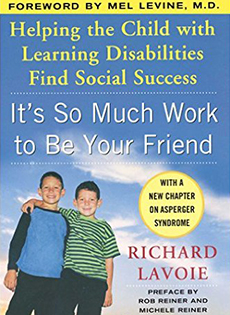What is Social Communication Disorder?
Social communication disorder (SCD) creates difficulty with the use of language and communication skills. While students with SCD have a firm grasp on language and communication, they struggle to use these skills in certain social contexts.1
Individuals with SCD may have trouble following social communication norms, using verbal and nonverbal signals, or altering language for different situations and audiences.1
- 2013 SCD was added to the Diagnostic and Statistical Manual of Mental Disorders in 20133
- 22% Of children previously diagnosed with Pervasive Developmental Disorder-Not Otherwise Specified (PDD-NOS) would now receive a diagnosis of SCD4
- 4-5 Children are typically diagnosed with SCD between the ages of 4 and 52
early signs of social communication disorder
- Trouble communicating in a way that is appropriate for the social context, for example, student may struggle to adjust language for the classroom versus the playground, or to a child versus an adult1
- Struggles with the flow of conversation, for example, taking turns and using verbal and nonverbal signals1
- Misunderstands idioms, humor, metaphors, or anything that is not explicitly stated1
- Problems using body language and eye contact5
- May say inappropriate things during conversations6
- Tells stories in a way that seems disorganized6
What to Do if You Notice Signs of Social Communication Disorder
Take Notes
If you begin to notice issues with the way your child applies language and communication skills, make a list of your concerns. The more information you can provide for a professional, the better.
Talk to Your Child’s Teacher
Start a conversation with your child’s teacher about any issues he or she has noticed in the classroom. Ask whether these behaviors are affecting your child’s schoolwork and interaction with peers.
Request an Evaluation
Before evaluating your child for SCD, you’ll want to have his or her hearing checked to find out whether hearing loss is a contributing factor. Once hearing issues are ruled out, you can have your child evaluated by a speech-language pathologist. Some schools have these specialists on staff.
Be Proactive and Trust Your Gut
As a parent, you know your child best. If you notice signs of SCD, it’s up to you to have your child evaluated and ensure that he or she is getting the right communication interventions.
What to Do if Your Child is Diagnosed with Social Communication Disorder
Find a Specialist
A child with SCD will not develop better communication skills without intervention. If your child has been diagnosed with SCD, he or she will need to work with a speech-language pathologist who specializes in social communication disorder.
Request Classroom Accommodations
By making small adjustments in the classroom, your child’s teacher can encourage better social communication. Ask your child’s teacher to:
- Practice greetings with your child at the beginning of the day7
- Respond to your child’s intended message instead of correcting pronunciation or grammar7
- Incorporate conversation role-playing activities that require your child to explain the same thing to different people7
Create an Individualized Education Plan
An Individualized Education Plan (IEP) lists out your child’s specific challenges, along with accommodations and goals for improvement. Work with your child’s teacher and school administrators to create an IEP. Be sure to request a copy to take home.
Common Social Communication Disorder Myths
Myth:Social communication disorder is a symptom of autism.
Fact:While children with autism may have social communication issues, they also have additional symptoms. Children with SCD are not necessarily on the autism spectrum.8
Myth:Children with SCD are not intelligent.
Fact:Social communication disorder shows up across the IQ continuum. Many individuals with SCD are smart, social, and successful.8
Myth:SCD only affects speech.
Fact:Social communication disorder can affect all types of verbal and nonverbal communication, including spoken, written, gesture, and sign language.8
Myth:A child who uses long, complex sentences and correct grammar probably doesn’t have social communication disorder.
Fact:Social communication is not a problem with sentence structure, but with using the right language in the right context. A child with social communication disorder may say things that are grammatically correct, but inappropriate for the situation or audience.6
Myth:Social communication disorder typically occurs on its own.
Fact:SCD can and does occur on its own, but it can also coexist with speech disorders, ADHD, and other learning disabilities.
Additional Resources on Social Communication Disorder
Shop through AmazonSmile and Amazon will donate 0.5% of your purchase to Churchill.

References
- Social (Pragmatic) Communication Disorder. Psych Central. Retrieved from http://psychcentral.com/disorders/social-pragmatic-communication-disorder/
- Swineford, L. B., Thurm, A., Baird, G., Wetherby, A. M., & Swedo, S. Social (pragmatic) communication disorder: A research review of this new DSM-5 diagnostic category. US National Library of Medicine. Retrieved from http://www.ncbi.nlm.nih.gov/pmc/articles/PMC4258293/
- Understanding Social Communication Disorder. Understood. Retrieved from https://www.understood.org/en/learning-attention-issues/child-learning-disabilities/communication-disorders/understanding-social-communication-disorder
- Social Communication Disorder: Parents Seek Guidance. Autism Speaks. Retrieved from https://www.autismspeaks.org/blog/2014/01/31/social-communication-disorder-parents-seek-guidance
- Social Communication Disorders: Overview. American Speech-Language-Hearing Association. Retrieved from http://www.asha.org/Practice-Portal/Clinical-Topics/Social-Communication-Disorders-in-School-Age-Children/
- Social Language Use (Pragmatics). American Speech-Language-Hearing Association. Retrieved from http://www.asha.org/public/speech/development/Pragmatics/
- Pragmatic Language Tips. American Speech-Language-Hearing Association. Retrieved from http://www.asha.org/public/speech/development/PragmaticLanguageTips/
- Social Communication Disorder Basics. Child Mind Institute. Retrieved from http://childmind.org/guide/social-communication-disorder/
